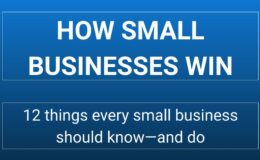Last year, I visited a small tackle retailer in Branson, Mo., near Table Rock Lake. Though it was spring and the fish were biting, this was a business trip. I was there to find out how his 1,200-square-foot store was able to weather the onslaught of much larger tackle retail competitors, and not simply survive, but thrive. Simple, he said, “I’m different.”
“Those [other retailers, which included several big box stores] sell tackle,” he said. “I sell service. I sell selection. I sell exclusive merchandise, including apparel. And, I sell [a customer experience] no big business can offer. We don’t even try to sell. We try to be helpful. The products sell themselves.”
I learned an important lesson that day, one that helped inform and reshape the advice I share with small businesses as a consultant. Being different must become an arrow in your brand’s quiver. Not only is differentiation effective at setting you apart as the most viable option in a sea of choices, but, most important, it becomes a moat competitors dare not attempt to cross.
Why differentiation is important for small businesses
As lifelong angler and outdoorsman, I’ve spent many hours on weekends in tackle shops across the country. I’m attracted as much to the idea of chasing fish as I am how store owners go about hooking owners to purchase products offered by sometimes-obscure brands. I’ve come to know that the best retailers focus as much on the sales process as they do having the best selection of products. Therefore, the best retailers are those who not only understand their market, but they also understand who comprises their core audiences, what their needs are, where they typically shop, which species they prefer to chase, and, most importantly, what they do better than the competition.
The Missouri retailer was masterful in all of these areas. How’d he help the store remain successful in the face of such stiff competition?
- Proprietary pricing
- Unique
- Unique merchandise selection
- Unique sales experience
I’ve never worked at a retail outfit, but I can relate to his experience, having spent years as a digital marketer and brand strategist for small and midsize businesses on product design, new product launches, and business strategy. Were I a local in the area, I would have visited this shop over all the others, including the big boxes, several of which were located nearby. The owner and his team worked mightily to put the customers first and it showed in their selection and their sales. The store owned the lion’s share of the outdoor retail in the area.
What makes differentiation a superpower for small businesses
Too often, business owners go into the endeavor with the “my-product-or-service-is-better” mindset, foolishly thinking customers will reward them with business for a product or service that does not satisfy their needs to a greater degree than what’s offered by the competition.
The other personality I’ve encountered all too often was the owner who, because he had deep pockets and a strong team, figured he’d created the blockbuster product that would shake the market upon arrival. “The market has never seen anything thing this,” I’d hear often.
In time, I learned that working for owners in either of these camps would be a frustrating affair.
I could not get why they didn’t get it.

Then it hit me: These owners only see what’s going on in the market and in their respective offices, workshops and labs. They don’t see what’s happening in the thousands of other labs, workshops and garages around the country and, indeed, the world.
Make differentiation a superpower for your brand
I vividly remember being on the phone with one serial entrepreneur from Virginia, listening intently as he talked of the new product he’d developed.
“Let me snap a picture with my iPhone and send it to you,” he said.
I immediately saw a problem: I knew or at least three other companies creating near-exact replicas. I was consulting for one of those companies.
“It’s a solid offering,” I said. “It is different that what’s already available. However, what happens if your product shows up to market and there are a half-dozen new products just like it?”
He hemmed and hawed, before finally settling on “I’d really be surprised, because I don’t think anyone else has thought of this before.”
You don’t know what you don’t know.
In business, however, what you don’t know can, will, and does hurt you.
Because I had to sign non-disclosure agreements with many of the businesses I worked with, I was typically unable to share what competitors were doing, even if I knew it would impact what my clients were slated to bring to market.
In time, I developed and shared a philosophy that served me and my clients well.
It began with three simple sentences that were reinforced and nuanced over time:
- Your product must be meaningfully different than the competition’s offering.
- Choose to attack an area of the market that’s least feasible for the competition to move into.
- Strive to own your area as opposed to being a first mover or fast follower.
Trust me, no CEO or marketing vice president wanted to hear such advice. They had cash and plenty of ideas. Being patient wasn’t in the cards. With time, I was able to show them that doing what everyone else was doing—or trying to do better than what was already being done—played right into the hands of the competition.
In future posts, I’ll break down each of the three points above, providing examples of why they are effective and how you can make them work for your business.
Give your business every chance of success by refusing to face the bear of competition head on. Instead, make the competition play your game by making differentiation a superpower for your small business.





